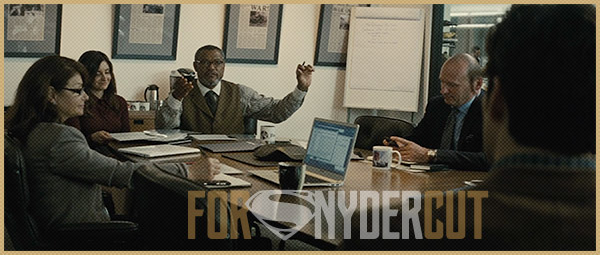
HOPE V. NIHILISM, OR, FINDING THE SOUL OF THE SUPERHERO—BVS review
by David Ting ’17
In short, this movie is about two super-people who hate each other because they misunderstand each other. I urge viewers to look beyond the city ruins, the black sky that unleashes sheets of rain, and that abominable monster reborn from the corpse of Superman’s nemesis from Man of Steel, General Zod (Michael Shannon). At the heart of Batman v Superman: Dawn of Justice, you’ll find a message of hope. A few frames near the end of the film are the keys: thousands of citizens crowd around a monument to Superman, which consists simply of his iconic “S” chiseled in the pavement. But the dedicatory statue is absent. Below the “S,” a message is chalked: “If you look for his monument, just look around you.” I can’t explain this anecdote better than by quoting the Bowie song “Heroes”: “We can be heroes, just for one day / We can be us, just for one day.”
Zach Snyder’s film suggests that super-qualities in any person are more important than superpowers. That’s why the film’s intellectual questions aren’t necessarily about man and God, but more about man and his ideals. In those terms, it helps to think of Lex Luthor (Jesse Eisenberg) as a parody of Nietzsche, who bemoans humankind’s trust in (religious) ideals; Luthor views the attempt to reconcile human ideals with human flaws as futile. The titular fight he puppeteers is a dynamic testing ground for his beliefs:
1) If heroes truly want to stand for ideals, they must be exposed for their flaws.
2) Although ideals fail, humanity can persevere through the power of knowledge.
3) Knowledge is a tool that can master anything and anyone, including superheroes.
Luthor’s mission to conquer Superman has a rational basis, but since it is driven by the fear of superpowers, his cunning plots perpetuate violence rather than diplomacy. If Luthor could acknowledge that hope has the power to inspire good, he could be content with the ideal of Superman as a savior; but rejecting that, his vices infect his genius.
In the titular heroes, we see respect and hope bound closely together, but Ben Affleck’s Batman hopes to gain respect through fear. Batman’s just vigilantism, as Nolan’s The Dark Knight showed, bypasses legal procedures and bureaucracy. But whereas Bale’s combat style was a martial-arts cool with gadgets from Armani, Affleck’s ruthlessness takes vigilantism all the way. When his merciless moral code conflicts with the law, the law loses. Have we ever seen a scarier Batman?
And have we ever seen a more burdened Superman (Henry Cavill)? It’s easy for him to mask his vulnerable soul with his cape, but the man—Clark Kent—suffers. Looking to Snyder’s previous film, we remember that Superman has been a bullied farm boy from Kansas; a homeless American drifter with odd jobs; a son who has lost two fathers; and on top of it all, a humanoid alien who has halted his own species from repopulating Earth. Superman bears the guilt of not having prevented the loss of human life in the battle that devastated Metropolis, as well the guilt of having killed the last, living member of his own species (General Zod). But Superman’s face seldom betrays these emotions. He’s a hero for fighting valiantly against a lifetime of internal battles. This amount of trauma would be absurd in any other medium, but the comic book genre is specially equipped to portray such a character because of the pop culture mythology already in place that institutionalizes Superman as a figure to believe in, a figure to save us.
This movie’s biggest problem is its volume. I blame the movie theaters, not Zack Snyder’s craft. To be crushed by sound during a smackdown can amp up the experience, but not when everything else threatens to curdle the eardrums. I believe that numerous critics and moviegoers walked away from this film numbed and bored for this very reason. The destruction in Man of Steel was equally earsplitting, which is why I brought earplugs preemptively to the IMAX showing of Batman v Superman. The range is a basic musical principle: let the pianissimo be tender so the fortissimo can roar. But the noise of this movie is mastered at a deafening default. By the time the mayhem of the third act hits, the fights become dull for lack of contrast. If the volume changes, we can begin giving this movie a fairer evaluation.
It’s a wonder that the special effects department can put these impossibly powerful figures on the silver screen. After Superman rescues a girl from a building in flames on Día de Los Muertos, the costumed revelers place their hands on him. The image potently conveys adoration and relief—it is remarkable that it remains powerful despite countless trailer reveals. This film redeems itself. The trauma, pain, misunderstanding, and evil acted out onscreen detoxifies its own nihilism because the film argues that hope is the supreme natural painkiller. Just watch the silt very carefully in the last few seconds of the film – you’ll know what I mean.
Grade: A-. Batman v Superman is a blockbuster meditation on the power of hope, a theme seldom examined seriously in superhero films, even though hope is what superheroes are all about . . . but don’t forget your earplugs at home.
Share the post "HOPE V. NIHILISM, OR, FINDING THE SOUL OF THE SUPERHERO—BVS review"
